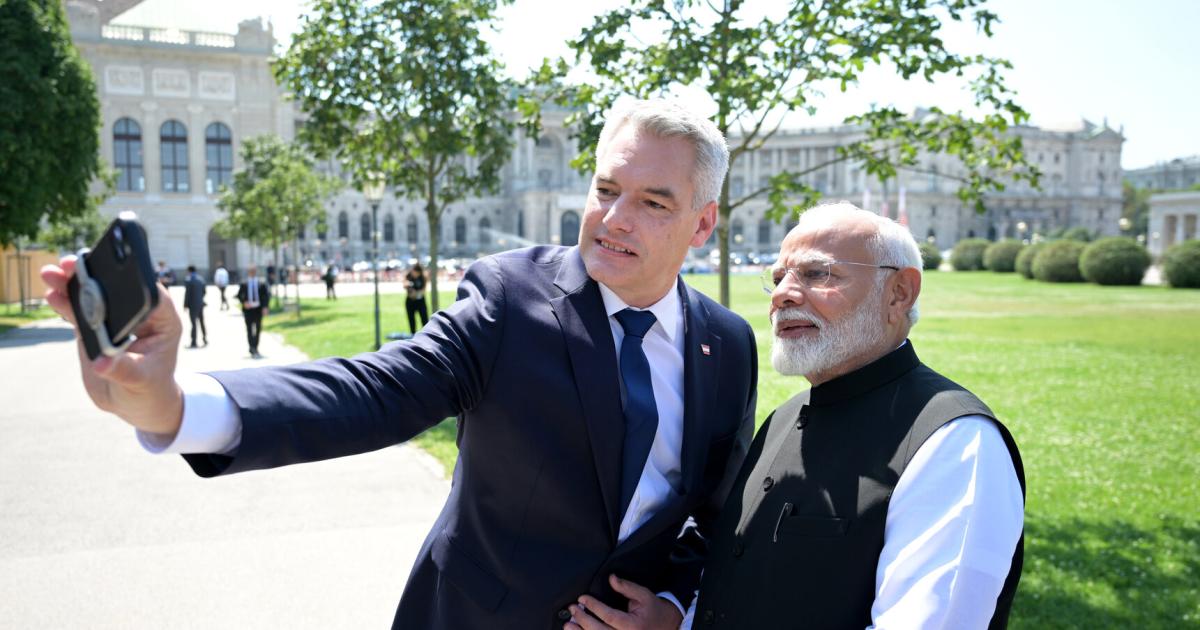Security measures as for a visit by a US President, a specially organized economic forum in the Vienna Hofburg and a lunch with around 100 personalities from science, art, culture and politics: Austria has prepared for today’s state guest, the Indian Prime Minister Narendra Modi,and its delegation of around 120 people did not skimp. According to the Federal Chancellery, this is “one of the most important diplomatic visits in recent history”.
It is indeed a historic event, as only two Indian heads of government have made it to Austria so far. The last one was Indira Gandhi 41 years ago, which was held by the then newly elected Chancellor Fred Sinowatz was a guest – whose predecessor Bruno Kreisky had just resigned after a poor SPÖ National Council election result.
Flown in from Moscow
While Gandhi’s stop in Austria was one of several on a larger European tour that also took her to Yugoslavia, Denmark and Norway, Vienna is just one of two destinations for Modi before returning home.
The Hindu nationalist flew in early Tuesday evening from Moscow, where he and his “dear friend” Wladimir Putin Just in time for the start of the NATO summit in Washington, they drank tea, stroked horses and praised each other.
Modi and Putin in the stable
This was not a regular visit either, but Modi’s first since the Russian attack on Ukraine in 2022, after the traditionally good relations between New Delhi and Moscow had cooled somewhat. But taking sides does not fit with the Indian government’s understanding of foreign policy.
And so, in recent years, Modi has been encouraged by more and more Western politicians such as US President Joe Biden or France’s President Emmanuel Macron and entered into arms cooperation agreements with them, while at the same time securing a lot of oil from Russia – which had become cheap due to the Western embargoes – and thus diligently paying into Putin’s war chest.
Surprise visit
It is not entirely clear why Modi chose Austria for his second state visit since his re-election a few weeks ago, in which his party suffered bitter and unexpected losses.
In the Federal Chancellery, it was believed beforehand that it might have had something to do with a statement made by Nehammer at the Ukraine conference in Switzerland a few weeks ago. He had highlighted a possible role for India in a possible peace-finding process in the Ukraine war.
The Chancellor and the Prime Minister are said to have discussed this very issue “intensively” on Tuesday evening at a confidential dinner in Vienna’s city centre and during a working meeting on Wednesday, as Nehammer announced to journalists on Wednesday. Together with Modi, he said, he had explored ways to initiate a process towards a “fair” and “lasting peace in accordance with the UN Charter.”
“Putin is listening to them”
Before the visit, Nehammer had already declared that he was relying “very heavily on India”. The BRICS states had “a special role” in the Ukraine war: “Putin listens to them”.
In Vienna, Modi declared once again that this was “not an era” of war. Problems cannot be solved on the battlefield. And: The loss of every innocent person is unacceptable. At the joint press conference with Kremlin chief Vladimir Putin in Moscow, Modi even declared that his “heart was bleeding” in light of the Russian army’s attack on a children’s hospital in Kiev on Monday.
His country, like Austria, is prepared to support any peace processes, said the Prime Minister. The two heads of government left open what this might look like in concrete terms. Other topics are also said to have been discussed, such as the situation in the Middle East, but also developments in the Indo-Pacific.
“Largest democracy in the world”?
Modi also wished Nehammer, whom he invited to India, and Austria “all the best” for the national elections in the autumn. Politicians often referred to India as the “largest democracy in the world”, and Modi once again called India the “mother of democracy”.
India has multi-party elections, but in recent years experts, the opposition, NGOs and the media have increasingly expressed concern that the Indian democracy under modes increasingly restricted become and decay. The Prime Minister is accused of turning India into a Hindu nationalist state and of oppressing the Muslim minority in particular. Political reporting has also become more difficult for critical journalists under Modi.
Indian skilled workers to fill Austria’s gaps
Less delicate: The talks in Vienna also focused on expanding Austrian-Indian economic relations. The official program, which began on Wednesday at 10 a.m. at Ballhausplatz with a reception for Modi, also addressed economic relations.
Welcome with military honours at Ballhausplatz
At the same time as the delegation talks in the Federal Chancellery, a large Austria-India business forum began in the Hofburg, with 40 companies from Austria and India registered to attend. One of Austria’s main concerns with regard to India is to have more Indian skilled workers.
Federal President Alexander van der Bellen wanted to meet Modi briefly. The police warned of traffic disruptions in Vienna’s city center in advance of the state visit.
An event for the Indian community in Vienna is likely to have attracted a lot of interest. Around 700 people have apparently registered to see Modi during his 24 hours in the country – after all, who knows how long it will be until the next time an Indian Prime Minister is here?
